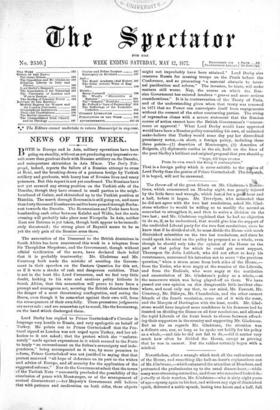The throw-off of the great debate on Mr. Gladstone's Resolu-
tions, which commenced on Monday night, was greatly injured by the little farce and wrangle, which lasted for a gout hour and
a half, before it began. Mr. Trevelyan, who intimated that he did not agree with the two last resolutions, asked Mr. Glad- stone whether he would be willing so to modify the second as somewhat to strengthen it, and then to waive a division on the two last ; and Mr. Gladstone explained that he had no objection to do so, if, as he understood, that would give him the support of the undivided Liberal party for the two first resolutions, since he knew that if be divided at all, he must divide the House with much diminished minorities on the two last resolutions, and since he could speak his mind on the policy he proposed as a whole, even though he should only take the opinion of the House on the part of that policy for which he could get moat support. Thereupon Sir John Lubbock, who did not affect to keep his countenance, announced his intention not to move " the previous question," when a storm arose from both sides of the House,— from the Tories, who were angry at the reunion of the Liberals, and from the Radicals, who were angry at the mutilation and emasculation of Mr. Gladstone's policy as a whole,—at the manoeuvre which was being played-off on them. We have passed our own opinion on this disagreeable little incident else- where, and need only say that, to our mind, Mr. Fawcett, Mr. Courtney, Mr. Dillwyn, Mr. Chamberlain, and the other earnest friends of the fourth resolution, came out of it with the most, and the Marquis of Hartington with the least, credit. Mr. Glad- stone would have inspired more confidence in his firmness had he insisted on dividing the House on all four resolutions, and allowed the tepid Liberals of the front bench to choose between offend- ing their supporters in the country and supporting Mr. Gladstone. But so far as regards Mr. Gladstone, the situation was a delicate one, nor, so long as he spoke out boldly for his policy as a whole,—and this he did not fail to do,—did it matter very much how often he divided the House, except as proving that be was in earnest. But the rubber certainly began with a. misdeal.


































